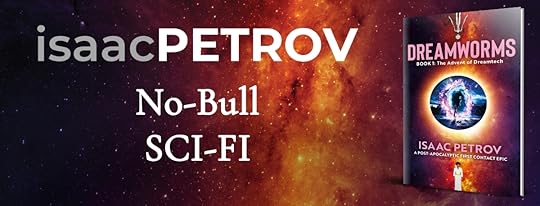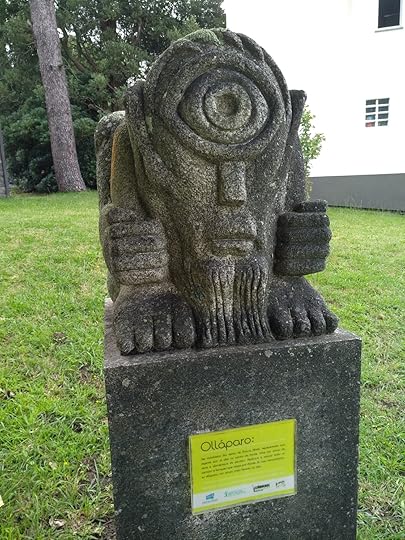What Defines Genre?

Greetings from Celtic Spain! I am on holidays, people! More than that, I am abroad! Woo hoo! Yes, for the first time in two years, I am farther than 30 km from home. So exciting! Here is a picture I made an hour ago on my morning walk. I thought I would share it. It is inspiring, isn’t it? I bet it inspires each of you in a different way. To me, it immediately reminded me of the Eye of Goah, Censor Smith and Gran Inquisitor Archer Rhodes. I’d be happy to hear what it brings to your mind? (comment away!)

Okay, before lunch (A tortilla de patatas awaits my ravenous son, nephews, wife and humble self in an hour, so I must hurry!), and since it is already the first Friday of the month, I wanted to shoot you a newsletter, before you forget your future favorite writer of all times. ;)
I thought I would write about something I was confronted with when I started writing Dreamworms (you haven’t read it yet? What are you waiting for? ). You see, so far, as I bet most of you, I just read books of different genres that interest me. Most notably, science fiction and, to a lesser degree, fantasy. You know, good, escapist literature. But when you write a story you love, like I did (and still am doing, second book progressing well, thank you very much), sometimes the genre it belongs to is not so obvious.
But that is a HUGE problem! An author (a publisher to be more exact) must establish the genre firmly, because otherwise the story will fail to sell (translation: no readers!). When I say Dreamworms is science fiction, I am aiming at a specific typology of readers (similar to myself actually) that have specific expectations, a tad different from even its cousin genre, fantasy.
But then, Dreamworms has some story elements that quite frankly belong in the fantasy corner. Sometimes I describe it to friends like a science fiction story with a touch of fantasy. Science fantasy? Some ask. No! Science fantasy (yet another subgenre, if you haven’t yet heard of it) is a totally different beast, wizards in space and such. Not at all Dreamworms.
This problem about categorizing a book got me thinking. What defines genre? What makes a story a romance, a thriller, a mystery, a fantasy? Well, I thought, science fiction and fantasy are clearly stories on “other” worlds—fantasies indeed—with no regard to reality. Was that the answer? And if so, what separates fantasy from science fiction? Is it that fantasy happens in medieval worlds? No, there is urban fantasy, very popular nowadays, which happens “beneath” the surface of our everyday world. Is it that science fiction happens in the future? Nope. Time travel, for example, might quite literally be the opposite. Is it that science fiction has a space-travel element to it? Most definitely not. Once again, time travel comes to mind. What if science fiction has a “science” component front and foremost? A semblance of reality linked to the known laws of physics? Hah! Faster than light travel, anyone? It’s total bollocks—any scientist will tell you. And… You guessed it: time travel! Well, what if time travel is fantasy, not science fiction? Wow, interesting out-of-the-box thinking right there, man! Sadly, it is not so simple. A reader of fantasy would never fall for that. And there are other exceptions. Always exceptions.
What is it then?! What makes a science fiction story different from a fantasy story? And from other forms of story?
I don’t pretend to have a definitive answer. But I have a simple theory. Let me illustrate it with
A Microstory
As the dragon’s fiery breath thrust towards him, Godrick Trollslayer leaps in a desperate roll behind the Stone of Rohm. As the magic fire touches the ancient structure, it appears to wake it up. The annals of the bards never spoke of such an event. The Stone of Rohm was supposed to be a dead ruin of a long-gone dwarven civilization. Or was that crazy prophecy right after all? The Stone begins to glow arcane energies, dissipating the dragon’s attack like it were made of smoke. Tendrils of light and magic pick Godrick up in the air, and surround him in an aura of arcane protection.
Okay, now let’s play with that a bit, and change a thing here or there, all right? Here you go:
As the alien laser beam blasts towards him, Flint Trond leaps in a desperate roll behind the Artifact of Rohm Prime. As the photonic outburst touches the ancient structure, it appears to wake it up. The archives of the Tendarii never spoke of such an event. The Artifact of Rohm was supposed to be a dead piece of technology of a long-gone alien race. Or was that crazy AI machine right after all? The Artifact begins to glow primal energies, dissipating the alien’s attack like it were made of vacuum. An invisible force field picks Flint up in the air, and surrounds him in a cocoon of protection.
There. See what I mean? It’s the same story! Same plot. Same character archetype. So what is it then that makes the difference? Is is the setting? Most certainly, that plays a role, I believe. Is it the tropes? I very much think so! After some reflection, I tend to believe that tropes are the key ingredient of genre. If you have dragons, magic and prophecies in a story, it is fantasy (doesn’t matter if in a medieval setting, in a modern metropolis, or in a dystopian future). That’s what readers in that genre expect and love. If you have aliens, futuristic weapons, crazy AIs and force fields, well, that’s what a science fiction lover expects to read about. Oh, and time travel is one of those tropes too!
As usual, feel free to reply with your thoughts. Perhaps I’m missing something?
What am I reading?
Since I am now on holidays, Goah be Merciful, I finally got back to reading “The Carpet Makers” by Andreas Eschbach. I read very slowly, because my free time is also in heavy competition with the revision of the Dreamworms audiobook, and the German translation, of which as of this same morning there is a finished first draft. But I still need to review it—and reviewing a translation is HORRIBLE. You need to compare paragraph with paragraph and make annotations. Incredibly time consuming. Not looking forward to that, I admit. Too lazy.
What are you reading?
Here are some recommendations that some of you shared with me by email. Please note that they are not their favorite books, but just some more recent books they enjoyed.
Mick loves the M.D Cooper's series (he recommends starting with the first book of the Intrepid saga). Both Chick J. and Beverley R. Recommends the Old Man's War series by John Scalzi (I read it myself, loved it!). Shawn B.’s suggestion are the Murderbot series by Martha Wells. Chris N.’s are a John Varley trilogy: Titan, Wizard and Demon. Sofokleus S. recommends Stephen King’s Dark Tower. Ken D. suggests the Forgotten Engineer, by T S Paul. Colleen M. J. recommends Altered Carbon by Richard K. Morgan.
Andrew M. recommends A World In Time by Larry Niven specifically for someone who has never read science fiction before. Thanks, Andrew!
Feel free to comment with your current/recent readings, but ONLY if you are really enjoying it, please! I want to share only decent recommendations.
What am I working on?
I am nearing the end of Dreamworms Episode V “Into the Shadow”. Episode VI (with which Book 2 is finally complete) is already drafted, so I hope it will not take as long as the previous two.
I’m also reviewing the audiobook chapters of book 1. It is actually an amazing experience. The narrator (Corinne Davies) is sooo good. She really brings Dreamworms to life. Absolutely fantastic, I am so excited. I still have no idea how to market it though. Oh, well. Step by step. :)
I want to leave a teaser, as usual. Let me browse some recent stuff… Hmm… Ah! This, for instance. It is from a chapter named “Barbarian” at the end of Episode V (unedited, so remain tolerant of typos, etc):
“Look, Mom,” the little boy in the pale blue eyes says, holding up a clam. Barefooted, and wrapped in little more than dirty layers of plastic and thick leaves, he is very young—cannot be older than five—and his accent is so strong, that Ximena needs a moment to realize that his words are indeed English. A very old English. “This one good?”
The young woman—she can’t be older than Edda, Ximena thinks—takes it and inspects it. “No, darling, too small,” she replies, and smiles at the boy encouragingly. “But keep at it!” Her clothing is not much of an improvement over the boy’s, although Ximena thinks there are rags of pelts in the mix, but so old and worn as to deem them almost unrecognizable.
“Arch!” another boy calls while running towards the little boy across the hard wet ground of the low tide. He is taller—larger—but not older. “Look what I found, Arch!” He raises a large, red crab in his hand, skillfully held between two fingers.
The rest of the tribe—a group of a couple dozen people—grace the beach in relaxed chatter while recollecting sea delicacies from the sands in a leisure pace. Ximena watches the group with the fascination of a paleontologist studying a lost stone-age tribe. They are all so young, she thinks. The oldest cannot be much older than twenty. And—Ximena smiles at the realization—they all have that thin blue tattoo running down their left cheeks like a chain of tears.
But this is not the stone age.
Enormous buildings—structures lost in time—raise like long-dead Goliaths behind them, around them, across the shallow sea, and even beyond the opposite shore, three miles away. Ximena gapes at the maze of brick, concrete and metal that spread in all directions as far as the eyes can see.
Nature—life—has taken over long ago. No wall is free of ivies, nor roof of seagulls, nor shadow of moss. And ancient oaks, sycamores and birches grow tall and proud between the buildings.
A tall, spiked clock tower emerging from the waters right between both shores catches Ximena’s attention, as does the gigantic Gothic-style complex to which it is attached. Although distorted by the merciless decay of time, she recognizes the place at once.
That’s all I have for you today. Happy out-of-this-world reading!
—Isaac, logging out
P.S. You can subscribe to my newsletter here.
P.S. In a few days, I am going to send a call for Betas for Book 2, in case anybody is interested. What is a Beta? A reader that gets access to the raw draft and gives feedback with which the author reshapes the final version. It is as much work as pleasure, let me warn you, but a Beta influences strongly the final work. Interested? Subscribe to my newsletter here.
Published on August 06, 2021 09:02
•
Tags:
genre-dreamworms-scifi-fantasy
No comments have been added yet.



